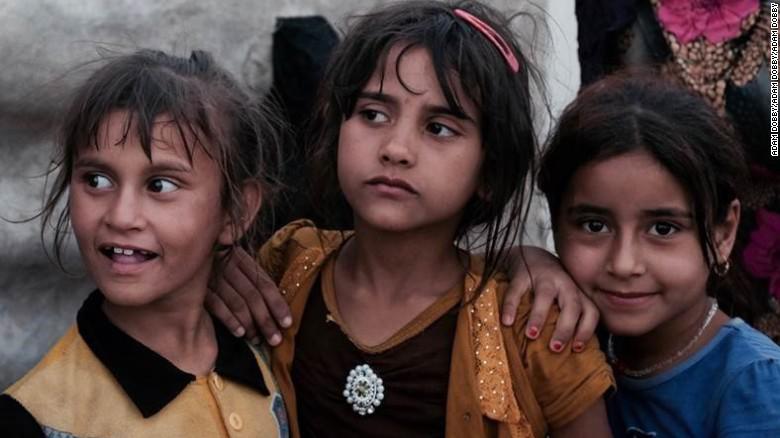
There was something strange in their eyes: a flat, empty, distant stare. The boys, especially the ones in their early teens, look at you, but don't see you.
I've been in plenty of refugee and IDP (internally displaced person) camps, where children thrill, become downright giddy, at the presence of a camera crew. They laugh, they chatter, they run around you, they jump and wave and goof off in front of the camera. In this dusty camp at the edge of Abu Ghraib, a Baghdad suburb, many of the older children seemed lethargic, almost indifferent to our presence.
They are children from the approximately 350 families staying in the Ahal Camp, housed in rows of cement-block single-room dwellings or in plastic tents with metal frames. The wind is hot, it's dusty, there's little in the way of basic amenities beyond toilets, electricity and water drawn from tanks. Some have been here for months, others recently arrived from the towns and villages around Falluja.
Thamir Ali, a shepherd, and his brother came here with their families, 23 people in all, last Thursday from the town of Karma, northeast of Falluja.
"We left our livestock, our cars, our houses, everything," he says. When the offensive began on 22 May, he recalls a frantic, fruitless search for cover where little was to be had. Describing the Iraqi forces air and artillery bombardment as "random," he said townspeople fled smaller homes to hide in multistory buildings for protection. In the lulls, ISIS militants went from house to house looking to round up civilians to act as human shields in the center of Falluja.
Thamir and his family stayed in their home, but intentionally left the door wide open.
"When Da'ish came," he said, using the Arabic acronym for ISIS, they thought the house was empty. Other families didn't do that. ISIS took them away or killed them in their homes.
When the militants fled and Iraqi forces took over Karma, Thamir ventured out into the street waving a white bed sheet. Government troops bundled him and his family onto a truck and brought them here.
As the battle approached his village, Talib Farhan recalls ISIS going from door to door announcing that civilians should walk to Falluja's city center, where, he said, they were to serve as human shields.
"It was an order," he said. "If you refused, they'd shoot you on the spot."
Following that order, he said, was certain death. He gathered his family and two neighboring families as if they were going to comply, but when the militants moved on to the next street, Talib led them in the other direction, more than 30 people in all, toward the thick marshes on the edge of town.
"We stayed there for three days, drinking dirty water, eating old dates. God watched over us. He hid us from Da'ish."
Um Khalid (she didn't want to give her name for fear of repercussions from Iraqi security forces) is relieved to be out of the line of fire, but relief is mixed with worry for her husband and two teenage sons. They were detained by Iraqi forces outside their town of Saqlawiya, held for questioning in the Mazra'a Camp, east of Falluja. "They said they would be freed tomorrow, or after tomorrow, or after after tomorrow. But I haven't heard anything," she said.
Falluja has long been a bastion of Iraq's Sunni Arabs. It was the first city taken over by ISIS in January 2014, the extremists capitalizing on deep grievances against the Shia dominated government in Baghdad. While Iraqi officials insist the offensive to drive ISIS out of Falluja is not against the local population, the Sunnis of this area are at best distrustful. The government and security forces, and many in Iraq's Shia majority, suspect them of harboring sympathies for ISIS, or worse. Already reports are emerging of abuse and torture of residents of the Falluja area detained by Shia-led paramilitary forces.
When I finished speaking with Um Khalid, a man beckoned me. He said he wanted to show me a boy with burns. I went with him to one of the tents, where I saw a boy, lying in front of a fan, a yellow sheet covering his lower body. His chest and abdomen were covered by an expanse of brown and red burn tissue, blood leaking down his sides.
Ten-year-old Muhammad Annad, from Saqlawiya, was burned by kerosene from the cooker in his family's kitchen. It happened, his father, Najim, told me, just before the offensive began. Reaching a hospital was impossible. They eventually fled Saqlawiya at night, Najim carrying his moaning son in his arms for hours through date palm groves.
Najim showed me a bag of medicine for Muhammad, including antibiotics, but clearly he should have been in a proper burn ward, not on a bloodstained blanket separated from the dirt floor by a thin plastic sheet. His father said he can't afford the trips back and forth to a hospital in Baghdad, or the medicine his son desperately needs.
All the while, Mohammed lay still, his eyes focused on Najim and me as we spoke. He held his left hand aloft, waving it slightly. He didn't whimper; he uttered not a word.
Outside, the smaller children were becoming more animated, laughing and joking with the crew, posing for still photos.
But the older boys continued to mill about, eying us with indifference. Time, I suppose, could heal their wounds. But this is Iraq: Before the old wounds heal, I fear, new ones will be inflicted.
Source: CNN
 FR
FR EN
EN AR
AR








